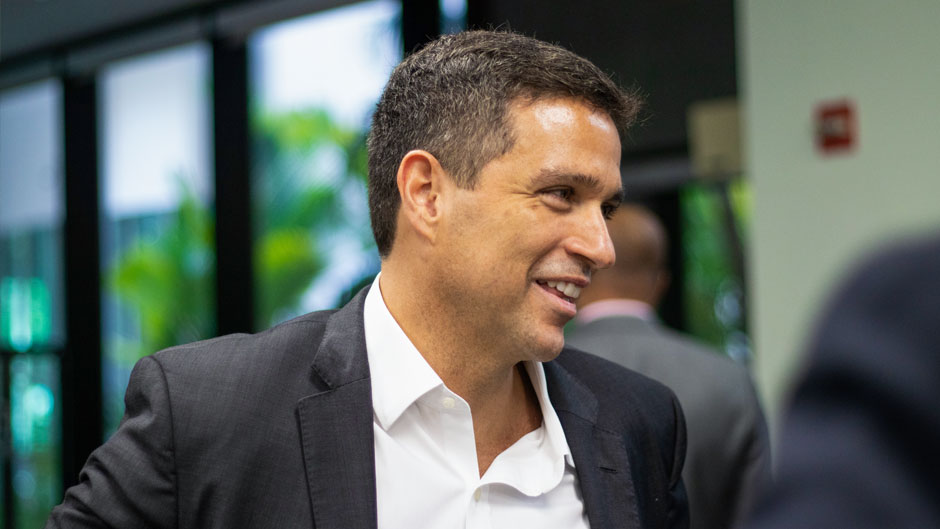In his talk to a select audience in Storer Auditorium on July 8, Brazil’s Central Bank President Roberto Campos Neto outlined a range of innovations to the financial system that have helped the country effectively adjust to two waves of the COVID-19 virus. His presentation formed part of the school’s Distinguished Leaders Lecture series and marked the first in-person presentation since the pandemic pivot.
Celebrated for his interest in economic sustainability policy and financial ingenuity, Campos Neto especially highlighted PIX—the new instant payment system launched in November 2020 and an ambitious agenda for open finance and financial inclusion.
“We thought we’d have 20 million keys (transactions) within the first six months, but we reached that number in three days,” he said, adding that the system is now used by 80 percent of the population. “The system has probably meant a little less revenue for the banks in terms of payments. But as we develop it, we see that it can do more and more.”
Dean John Quelch described the PIX system and other innovations launched and being explored by the bank as “fascinating.”
“This concept of reinventing the central bank as a technology enterprise is really radical disruption and very impressive—I’ve never heard of it before,” he said.
He noted that the automated payment system that incurs no cost to consumers has prompted a huge increase in the number of cashless transactions, while more traditional forms of transactions have remained basically flat.
Alex Horenstein, associate professor of economics, described PIX as a Brazilian-customized and quite sophisticated version of Venmo, with for example, the added benefit that there is an off-line version, as significant areas of Brazil lack internet access.
“The fact that there is such an advanced version of a digitalized currency developed by a Central Bank already massively adopted is amazing,” Horenstein said. “It’s not yet, but it could be the base of a fully government digital currency or govcoin—that could be concerning for the banks.”
The central bank president, who earned a master's degree and a bachelor's degree in economics from UCLA, suggested the innovations were driven in part by the findings of a study group of young gamers who were asked to describe their ideal financial system. The group identified five key characteristics: cheap, transparent, secure, open, and fast.
Campos Neto became head of the central bank in November 2019 and soon after, as the pandemic spread, he said that he and his team realized one frightening thing.
“We found out that there were hundreds of cities that did not have ATM machines, there was no way for people to get money,” he said. “People would take a bus to another city to get money.”
So they designed a system to address the problem.
The system is now in use by 80 percent of Brazilians, according to Campos Neto, who added that more innovations—a PIX card that will operate as a bus pass that can be shown—will be released in coming weeks.
The bank needed to continue to innovate, to test digital currencies, and to explore how to better monetize data, Campos Neto pointed out, adding that Brazil’s currency laws date to 1960.
In welcoming the speaker, Paulo Leme, executive-in-residence finance professor, honored Campos Neto as a “great finance mind, a strong market economist, and a very good politician—someone who knows how to stay out of trouble.”
In his role as president, Leme said Campos Neto has transformed the financial system and moved Brazil to a new frontier—and that he even stepped in to fill the public health policy gap by providing for vaccines deployment to stabilize the country.
“He was able to get things moving and, even more than leadership, that demonstrates compassion,” he said.
The Banker’s Magazine, part of the Financial Times group, awarded Campos Neto its Central Banker of the Year 2021 award.
One of “his biggest surprises” on joining the central bank, Campos Neto said, was the high-caliber of expertise—contrasting the notion that many who work for the bank are overly bureaucratized.
“This was a small group of people, all with Ph.D.s, and they wanted to learn, so I sent them abroad to learn about the new technologies,” he explained.
That said, if vacancies were to occur at the central bank, Campos Neto said he will not be looking to fill them with economists, but instead with data analysts and Ph.D.s in information technology, artificial intelligence, and big data.
Known for his interest in developing sustainable economic policies, Campos Neto was asked if he supported the Dutch carbon tax model.
He suggested that completing the market for carbon was a better option than taxation.
“You have this negative externality, people are doing damaging things in the Brazilian forest, and you would be willing to pay for them to do things differently—and they would be willing to do things differently if they could receive payments, but you can’t make this happen,” he explained. “The way to solve this is to have a market for carbon that actually trades, that is liquid and accessible to everyone. But so far, we have failed to complete the market,” he added.
“People try to offset this failure by taxing, but that’s horrible,” he continued, “price allocates resources in the economy efficiently and tax does the opposite. I’m very frustrated when I go to global meetings and people spend a lot of time talking about global taxonomy to address this.”
To a question of who would become the next central bank president, Campos Neto said he didn’t know. “But one thing for sure is that they will know more about technology than I do,’’ he said, “and the one after that, will need to know even more.”

